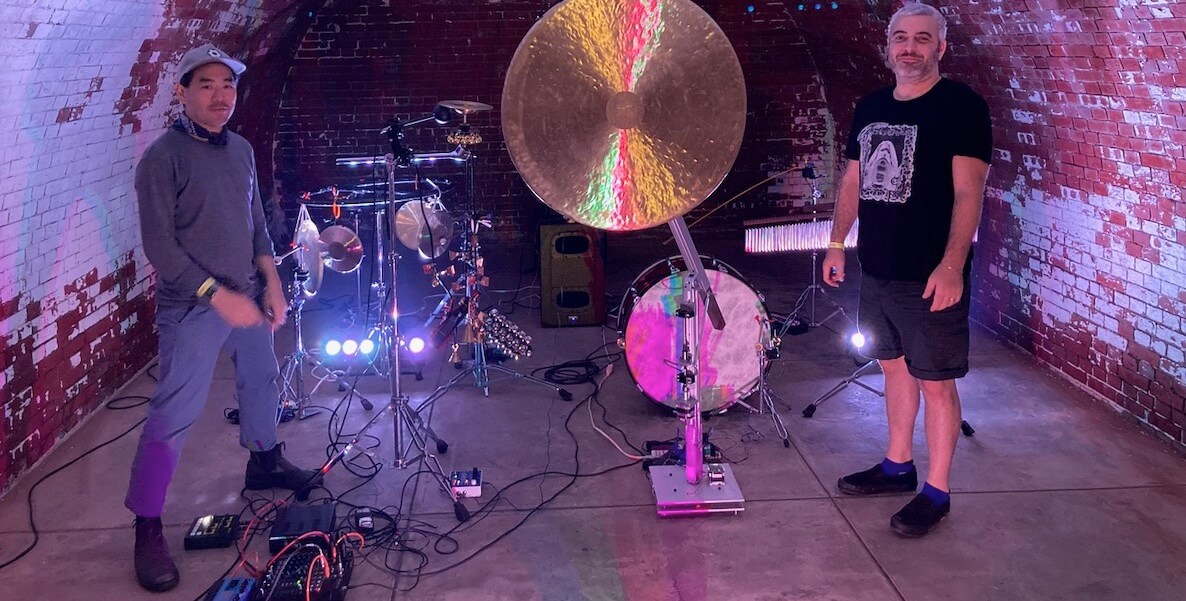Despite being the Director of Sound and Music Technology at the University of Pennsylvania for over 20 years, Eugene Lew has a very small online footprint. As a public persona, Lew is similar to the modular synthesizers used in his classroom: difficult to learn about, easy to love once given a chance. Although Lew prefers to keep his social life, well, analog, he can be found IRL at underground music events all over Philadelphia, where he is known for his easygoing demeanor and generous spirit.
Many genres exist under the umbrella of experimental music: ambient, new age, free jazz, space music, noise … Throughout the years, Lew has explored a range of these styles in his improvisational practice. Possessing a knack for synthesizers, percussion and sound engineering, Lew is a versatile creator and collaborator who centers his diverse work around the idea of a religious gathering, a place of worship. “I’m basically interested in activities related to visiting and building shrines — and the belief that these activities are best with others.”
His recent endeavors include TOTALLY AUTOMATIC, a three-person band featuring drums, saxophone, and electronics. The sound of droning notes or clanging cymbals may not be everyone’s cup of tea, but that’s alright with Lew. “To me, hating something is the same as liking something,” he explains. “Indifference is the greatest insult.”
Even with a vast skill set, Lew is hesitant to sing his own praises. He prefers to lift up his collaborators and colleagues, giving credit to organizations such as Great Circles and Making Time for synthesizing communities around these disparate genres. His latest venture is a collaboration with textile artists Emily Carris-Duncan and Rachel Snack. Together the trio are Shuttle Service, a community-based project that looks at the conceptual and material overlap between weaving and music. Shuttle Service mounts their first exhibition from January 12 through February 29 at The Arts League.
As part of a partnership with Forman Arts Initiative, the Citizen caught up with Lew. The interview has been condensed and edited for clarity.
Where are you from originally?
I was born in Queens and grew up in Manhattan. I have also lived in New Jersey and California, where I got married, and then later moved to Philly. I’ve lived in Philly the longest … at 11th and Walnut, 2nd and Fitzwater, Chinatown, and then West Philly. I love the trees in West Philly. But I was really into living in Chinatown and being able to get food from so many different places at any hour of the day. I love Philly. I love saying, “Go Birds.”
Did you move to Philadelphia to teach?
No, I actually never intended to teach! Even though I had been doing the work that my class addresses for a long time, it’s different to move that into teaching. Before I taught, I was at Temple briefly studying composition. I think I dropped out the same time I started [instructing] at Penn.
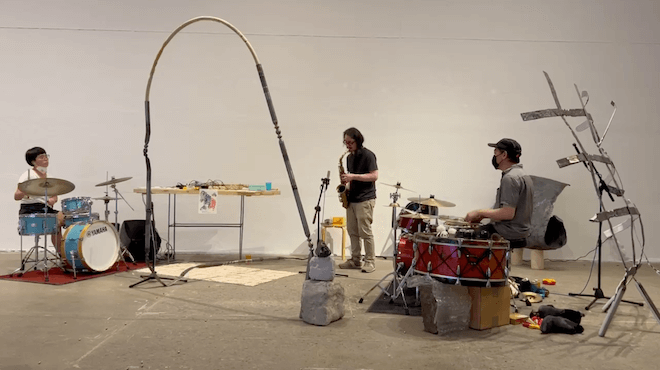
I teach recording music theory methods, which focuses on performance. I also do an electronic music, modular electronic systems course, which also focuses on performance. Teaching keeps you on your toes. Over the years, I’ve had to make changes as the times have changed. Early on, the electronic music course was computer-based because it was cost-prohibitive to have modular systems. The lowest entry point was probably around $50,000.
Our department had to slowly build a stable of instruments. When I say slowly, it took about 10 years. Now, in the modular electronic systems course, we don’t use computers at all. I mean, technically some of the modules are computers, but there’s no laptop and no recording.
Why didn’t studying composition work for you?
Back then, the compositional world was definitely more traditional. You would write a piece of music and then get someone else to play the piece. I think that’s what’s beautiful about electronic music: You can make everything and play everything. As you’re composing it, you are performing it. That’s not to say that people haven’t made amazing work that is composed and then other people interpret it. It’s just that I recognized I didn’t want to do that because I don’t really like telling people what to do.
Do you have training on a particular instrument?
I was forced to take piano, and I think I’m still trying to undo stuff from that training. It makes you think a certain way. The piano is a digital instrument in that you press a key, and it makes a note. The piano also weeds out all of the notes between each key. The idea that if you play a certain set of notes, you will know what chords will follow or should follow, that dominates Western music.
I played bass for a while. I still play bass, but I sold my double bass during the pandemic. I guess at present, I would say that my focus is on percussion, which is to say my focus is not on anything at all, because percussion is just so many things.
I don’t consider myself a musician. I play music, but I’m not a musician. Musicians are people who just play music all the time. I think I’m more interested in other stuff.
What was your entry point into modular synths?
Modular synths were something I knew about, but the cost of entry was so high. Actually, where I got the bug was at Temple. One day my prof, Maurice Wright, had pulled out an Electrocomp EML-200, a semi-modular synth hardware, from the closet. He was like, “Oh, I thought you guys would want to try this out.” So, me and my cohort really went to town on it. We’re like, “This is what we wanted to work with forever!”
Maurice Wright encouraged exploration, thinking beyond just music, and modeled a balanced way of learning, living, and working that remains influential to me to this day. Together we worked on NeXT, Silicon Graphics, and Apple systems, which were way beyond my reach, financially speaking.
After moving to UPenn, I was lucky enough to work alongside with and learn so much from James Primosch for over 20 years. There, I also had a chance to spend quality time with a large format modular system and build out an electronic music studio centered on modular systems. Of course, synthesizers and tape machines were the main tools at electronic music studios before computers took over the world so I recognize that the arc I had with them is a bit backwards.
Has your teaching approach changed as technology changed?
I’ve always been pretty consistent. I want to encourage creativity and exploration. That’s one of the reasons why I switched to hardware in the classroom. For most of the hardware we use, you can’t recall settings. So, if we work on something together, patch it up with cables and then leave until next week, someone else might come in and un-patch it to do their own thing.
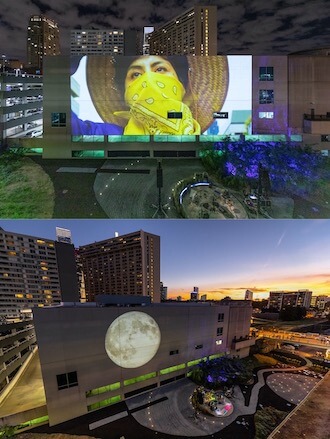
A computer program, like Ableton Live, is great, but what you’re actually doing is only selecting presets, not creating new sounds. You can go, “I want tubular bells, a dog barking and xylophone,” but you’re not really exploring. You’re not really finding your own sound. So, that’s my ultimate goal, to encourage people to find their own sound and their own voice. I will issue the caveat that if you’re in a rush and you have a deadline approaching, fire up those presets!
Why don’t you share more about yourself online?
I like that anonymity. Maybe it was more so a thing in the past, but with electronic music, someone would have 10 different project names. Everyone had a different pseudonym, which of course makes it tricky for anyone to get an idea of what anyone does. I mean, even Aphex Twin had so many project names. It was fun coming up with pseudonyms.
What influences you the most as a creator?
I think my main influence is always going to be nature. But not in the sound healing sort of way. A lot of the sound healing approach is gentle. Recently I did a set with multimedia artist Grace Villamil at Governors Island. The performance was about water. We had a speaker in water that would bubble up as sound played. I had a sub and four boxes all around the room. When we started performing I realized, Oh, everybody probably thought they were in for a sound healing session.
Instead, we were channeling Maryanne Amacher, an electronic music composer who would make these impossibly loud pieces. The volume for our performance wasn’t dangerous or painful, but it was definitely immersive. The sound was all-enveloping, just like you’re at the ocean.
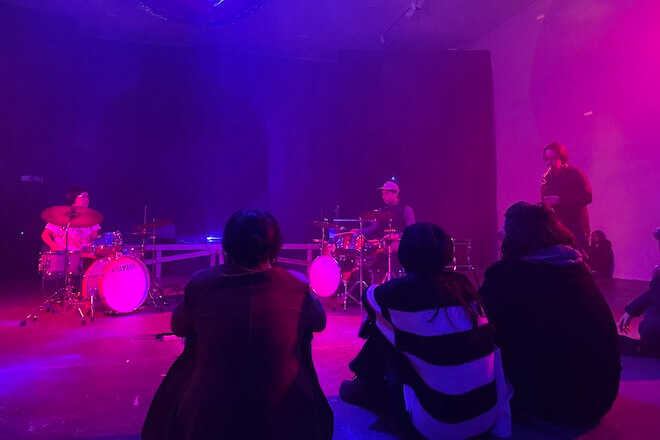
Can you tell me about your show at University City Arts League?
It’s a project called Shuttle Service that’s led by Emily Carris-Duncan, Rachel Snack and myself. What we’re presenting in January is a group show, but I’m not showing anything. Most electronic music people don’t encounter weaving and vice versa. And they might want to keep it that way, but at least for that one moment while they’re visiting, they’ll see it in the same place.
Emily made a textile piece and dyed it by singing “Wade into the Water” into the dye bath via transducers on the side of the dye bath vessel. So the piece is imbued with the voice of her singing through the dying process. Jacob Weinberg and Anna Bockrath are also presenting their collaboration work, where they used weaving drafts to basically generate sound. We’ve always wanted to do an exhibition, and hopefully this will be the first of several exhibitions.
What I like to do most is work collaboratively. I love performing with other people because then you can have a conversation, try new things, and I extend this to sort of everything. It’s just more fun. It’s more fun to cook with friends. They might chop something weird, but it’s still more fun.
Logan Cryer is a curator based in Philadelphia with a penchant for local art histories. They currently serve as the Co-Curator of Icebox Project Space and they like to rewatch documentaries.
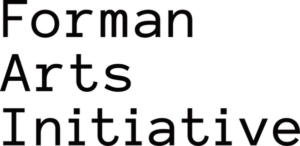
This story is part of a partnership between The Philadelphia Citizen and Forman Arts Initiative to highlight creatives in every neighborhood in Philadelphia. It will run on both The Citizen and FAI’s websites.
![]() MORE FROM OUR ART FOR CHANGE SERIES
MORE FROM OUR ART FOR CHANGE SERIES
MOON RABBIT IN THE POWDER MAGAZINE, HUNGRYMONSTERS x HEARTS OF DARKNESSES, Making Time, 2022



